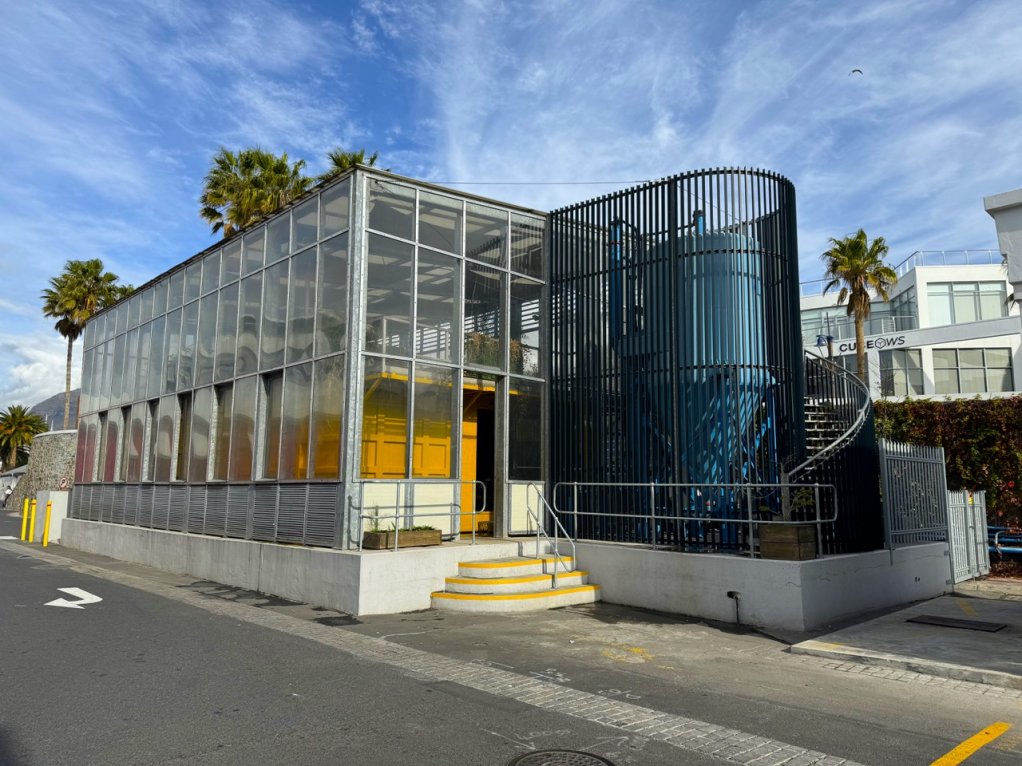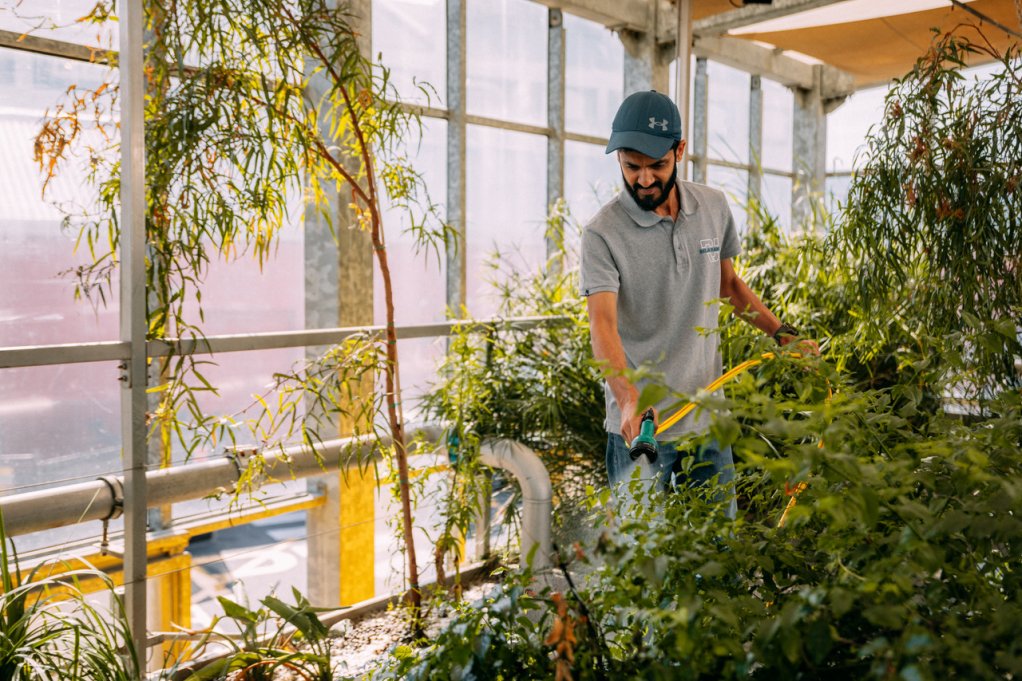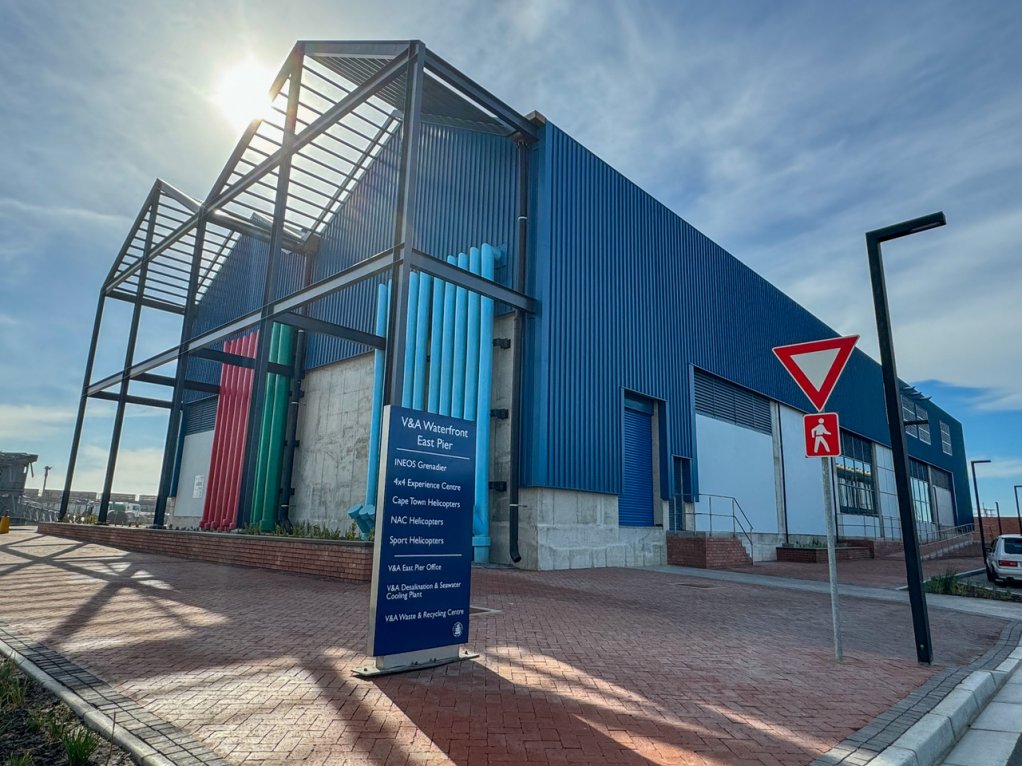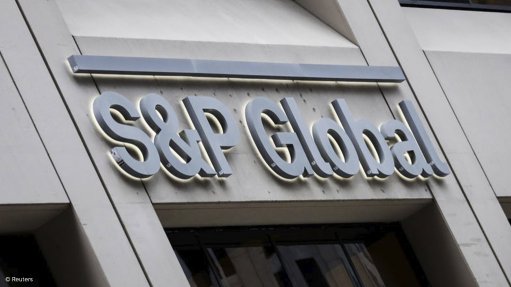Already green V&A Waterfront eyes starting up desalination plant; building second seawater cooling plant




The blackwater treatment plant at the V&A
Inside the blackwater treatment plant at the V&A
The V&A desalination plant
Since starting its sustainability journey in 2008, the V&A Waterfront (V&A) in Cape Town has reduced its energy use by 40%, with 2 MW of photovoltaic (PV) solar panels generating 1 640 000 kWh of clean energy a year.
The precinct has also diverted 62% of its waste from landfills. This includes more than 2 300 t of organic waste and 2 100 t of recycling every year.
The V&A is also home to 22 buildings that have been Green-Star rated by the Green Building Council of South Africa (GBCSA).
“For a really long time our philosophy was to design and build sustainable buildings with a target of achieving a minimum four-star rating with the GBCSA,” says V&A sustainability senior manager Petro Myburgh.
“Our future goal is to build buildings that achieve a net-zero rating. I think this is doable.”
The V&A, owned by Growthpoint Properties and the Public Investment Corporation, is also home to a blackwater treatment plant that can process 200 000 l a day, producing treated effluent that is used to flush toilets.
An Organica Blue House provides a fully enclosed and odourless environment, combining conventional wastewater treatment technology with a botanic ecosystem. Organica uses plant roots to grow into the effluent, encouraging bacteria and living organisms to develop.
The V&A has also, since 2008, achieved a 47% reduction in carbon emissions.
In another, more recent, development, a new café has been built using only waste materials harvested throughout the V&A precinct.
The construction industry is responsible for about 19% of global carbon emissions and the Portswood Café was designed to show what can be achieved with this approach.
“We are always open to invest in technology; to work with business and universities to find better and smarter ways of doing things,” says Myburgh.
V&A communications head Donald Kau notes that the precinct is able to deploy and test new technology more rapidly than government institutions can, which means that it is welcoming a growing number of local authorities seeking information on the technology rolled out at the V&A.
In an effort to further enhance its sustainability efforts, the V&A has committed to eliminating single-use plastics by next year, while also ensuring that new buildings in the precinct achieve a minimum net-zero green rating.
Myburgh says the precinct will also establish a waste-to-energy pyrolysis plant to divert waste from landfills and produce synthetic gas for electricity, complementing solar power.
The 123-ha mixed-use destination welcomes 24-million visitors a year, each leaving behind 250 g to 300 g of waste a day, she notes.
“Hopefully, by the end of next year, the bulk of our waste will be converted into energy, with the exception of glass and metal,” says Myburgh.
A new desalination plant has already been commissioned and should become operational in September. This plant will provide fresh water to the neighbourhood, thereby reducing the strain on Cape Town’s fresh water supply.
The desalination plant is to produce 3.3 megalitres of water.
“To make sure that we do not add to the already constrained electricity grid, our intention is to use energy from the waste-to-energy plant,” explains Myburgh.
The remaining 40% of electricity required is to come from an expanded solar PV programme, set to progress later this year.
“In the Silo district, we have invested in a seawater cooling plant, where we save roughly 15-million litres of water a month,” adds Myburgh.
“The plant takes seawater and circulates it through heat exchangers, and that helps to precool the air before it goes through the HVAC system.
“This has meant a saving of 40% in energy compared with traditional cooling tower systems on individual buildings.
“The system has proved to be incredibly water and energy efficient.”
Myburgh says a second seawater cooling plant, designed to save 25-million litres of water a month, will be built next year. This will replicate the technology in the Silo district.
Article Enquiry
Email Article
Save Article
Feedback
To advertise email advertising@creamermedia.co.za or click here
Press Office
Announcements
What's On
Subscribe to improve your user experience...
Option 1 (equivalent of R125 a month):
Receive a weekly copy of Creamer Media's Engineering News & Mining Weekly magazine
(print copy for those in South Africa and e-magazine for those outside of South Africa)
Receive daily email newsletters
Access to full search results
Access archive of magazine back copies
Access to Projects in Progress
Access to ONE Research Report of your choice in PDF format
Option 2 (equivalent of R375 a month):
All benefits from Option 1
PLUS
Access to Creamer Media's Research Channel Africa for ALL Research Reports, in PDF format, on various industrial and mining sectors
including Electricity; Water; Energy Transition; Hydrogen; Roads, Rail and Ports; Coal; Gold; Platinum; Battery Metals; etc.
Already a subscriber?
Forgotten your password?
Receive weekly copy of Creamer Media's Engineering News & Mining Weekly magazine (print copy for those in South Africa and e-magazine for those outside of South Africa)
➕
Recieve daily email newsletters
➕
Access to full search results
➕
Access archive of magazine back copies
➕
Access to Projects in Progress
➕
Access to ONE Research Report of your choice in PDF format
RESEARCH CHANNEL AFRICA
R4500 (equivalent of R375 a month)
SUBSCRIBEAll benefits from Option 1
➕
Access to Creamer Media's Research Channel Africa for ALL Research Reports on various industrial and mining sectors, in PDF format, including on:
Electricity
➕
Water
➕
Energy Transition
➕
Hydrogen
➕
Roads, Rail and Ports
➕
Coal
➕
Gold
➕
Platinum
➕
Battery Metals
➕
etc.
Receive all benefits from Option 1 or Option 2 delivered to numerous people at your company
➕
Multiple User names and Passwords for simultaneous log-ins
➕
Intranet integration access to all in your organisation





















